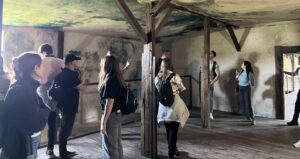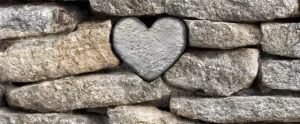People up and down the country of Israel will light bonfires to celebrate “Lag B’Omer” – the 33rd day of the Counting of the Omer. The air will sizzle with sparks and families will gather around a fire with friends, while religious Orthodox Jewish people will flock to a place called Meron for the celebration to be by the graves of famous rabbis – some believe by stretching out on their graves they can somehow absorb some of the rabbi’s spirit.
This is not a Biblical holiday. In fact it is quite the opposite.
Twisting God’s story
The counting of days between Passover and Pentecost (the Feast of Weeks) is supposed to be a time of eager anticipation. Here is the original intention of the time of counting the Omer in the Bible:
You shall count for yourselves – from the day after the Shabbat, from the day when you bring the Omer of the waving – seven Shabbats, they shall be complete. Until the day after the seventh sabbath you shall count, fifty days. (Leviticus 23:15-16)
You shall count for yourselves seven weeks, from when the sickle is first put to the standing crop shall you begin counting seven weeks. Then you will observe the Festival of Shavu’ot for the LORD, your God. (Deuteronomy 16:9-10)
An “omer” of grain was brought each day, a blessing was given, and the days counted down to Pentecost or Shavuot. This is where the expression “counting the omer” comes from. The word Pentecost comes from the number 50, because they had to count 50 days from the Passover festival to the feast of Shavuot, the Feast of Weeks. God’s desire was to help his people connect the two feasts in their minds and to count down to the Feast of Weeks; the time of celebrating first fruits. As we know now, Passover foreshadowed the redeeming work of Yeshua at Calvary, and Pentecost foreshadowed the phenomenal pouring out of the Holy Spirit.
But Lag B’Omer interrupts this countdown to focus on other things entirely.
What is “Lag B’Omer?”
During this time of counting the days between Passover and Pentecost some events transpired in Jewish history back in the late first century and early second century after Yeshua which gave rise to this tradition… but it flies in the face of God’s intentions for his people.
The “Lag” is better represented as just two letters – L and G. Together they mean the number 33 because L means 30 and G stands for 3. Up until the 33rd day of the 50 day Omer countdown, rabbinic Jewish tradition imposes a time of mourning, forbidding feasting, weddings, and celebrations… and haircuts as well. But the scissors come out on the 33rd day of the Omer, the ‘LG’ of the Omer, which is a time for celebration. There are different reasons for celebrating according to different traditions, but the two main stories are as follows:
The Story of Rabbi Akiva and his False Messiah
After Passover one year in the early second century, Rabbi Akiva’s disciples were struck by a plague and 24,000 of them died. However, on the 33rd day of the Omer, the plague was apparently brought to a miraculous halt. This is one of the reasons for the celebrations. It should be noted that Rabbi Akiva had hailed Simon Bar Kochbar as the Messiah. Akiva’s disciples and all patriotic Israelites were expected to rally behind Bar Kochbar’s plans to liberate the Israel from the Roman oppression, and support him as the promised Messiah. This obviously created problems for the disciples of Yeshua, who could not support this false Messiah claim. Their refusal was seen as betrayal of the Jewish people and cut a deep ravine between those who followed Yeshua and the Jewish majority who followed the other rabbis in the other direction. Today the bonfires are often seen as marking a time of heroism and nationalistic pride, but it’s pride in human rebellion, not in God’s victorious provision. As HaAretz Israeli news site says dryly, “Here are the results: About 580,000 Jews were killed, 950 communities were destroyed. We embarked on a 2,000-year exile.”[1] Not really a cause for celebration.
Sadly, because nobody wants to suggest that Rabbi Akiva’s words are fallible, and that he made a big mistake in naming Bar Kochbar the messiah, many Jewish people would say that Bar Kochbar was ‘a’ messiah, but that he was unable to reach his full potential. It has twisted people’s ideas of who the promised Messiah should be, and driven a wedge between “patriotic” Jews who followed this false messiah, and wrongly labelled those who followed the true Messiah as ‘traitors’.
The Story of Rabbi Simon Bar Yochai and his “Deep Secrets”
The other story is that of Rabbi Shimeon Bar Yochai who, it is said, passed on the deep secrets of Kabalah on the day that he died, in the form of the Zohar – the source texts of Jewish mysticism. He didn’t want his death to be a sad day, but wanted people to rejoice and celebrate with light. To this day, thousands of Orthodox devotees go to worship at his grave for Lag B’Omer, to remember this Rabbi and celebrate the giving of the Zohar. Worshiping by graves, it should be added, is very much contrary to what Yeshua stood for, and is an abomination to God (Isaiah 65:4). The Zohar itself contains dark mysticism, tinged with the occult.
Neither of these two events are causes for celebration for those who love Yeshua. They are false hopes full of deceit that are leading Jewish people astray. Human warriors cannot redeem, and occultic mysticism is dangerous fire to play with.
This passage in Jeremiah 9:1-3 breaks my heart as I see God’s sorrow for the deceit and lies that his people are living in:
Oh that my head were waters, and my eyes a fountain of tears, that I might weep day and night for the slain of the daughter of my people!… Falsehood and not truth has grown strong in the land; for they proceed from evil to evil, and they do not know me, declares the Lord.
Please pray earnestly for the people of Israel to see through empty lies and false promises, and to hunger and thirst after the real God of Abraham, Isaac and Jacob and his TRUE Messiah. We worship a God who is not the God of the dead but of the LIVING! Please pray in these days leading up to Pentecost, the Feast of Weeks, that God would pour out his Spirit of truth and revelation on this land and on his people.
[1] Yossi Sarid, Bar Kokhba’s Legacy of Lies, May 11, 2012
















